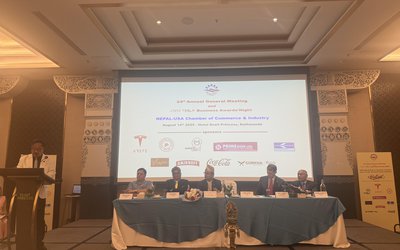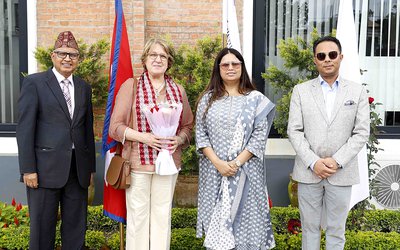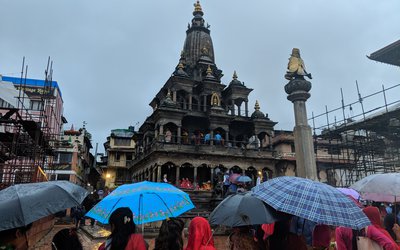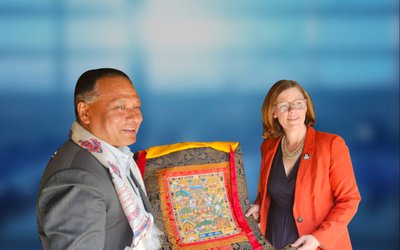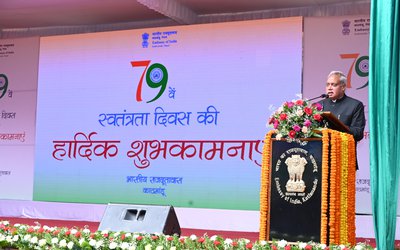The first editor-in-chief of "Asmita" monthly magazine, Susan, a well-known Nepali writer, music personality and author in literature and women's empowerment, called the diary of a journalist based in WordPress.com. I had the opportunity to read part-12 (spirituality and blind faith) of a series titled "mother-daughter-three generations".
As a student, we heard that she always sleeps with a photo of his mother under his pillow because of the serious nature and the feelings she shows towards her mother. She wrote that somewhere in his article and confirmed it herself.
Presented in the series are three mothers of Nepali women indicating the story of “Britanta”, her mother - Krishna, herself - Susan and her beloved daughter - Astha.
How spirituality and superstition are passed down through generations is presented in a very poignant and interesting way through a personal narrative.
The soul story or the story of the story is not of a place but of the different surroundings of the same person. She has seen, experienced and felt the changes from her mother to her daughter.
In that sense, it is hoped and believed that this story of hers can take the form of a film. She has explained in emotional detail how she received spiritual beliefs and some superstitions from her mother and how these beliefs have reached the third generation (the author's daughter).
Main content:
Continuity and repetition of the past: She quotes the Sufi poet Rumi's statement "Yesterday is gone, and taken away its tale, today we must live to tell a fresh story" in her "Yesterday" She says that she did not carry the stories of the past with her, but rather, she kept them in her mind. This beautifully presents the main concept of how past experiences, beliefs and traditions affect the present and the future. "The past can be connected, continuous and repetitive, and can also affect the present and the future for generations to come." It is said .
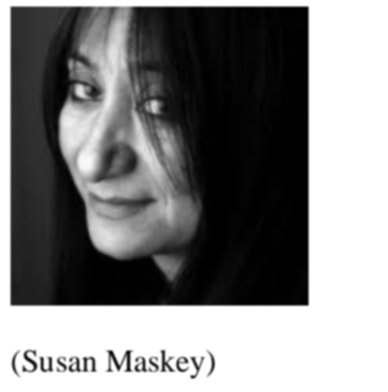
Her statement that there is a bridge between the past, present and future and that there is a sequence. Planting the seeds of spirituality in childhood: It is clear how the foundation of spirituality was laid through the influence of her mother in her childhood.
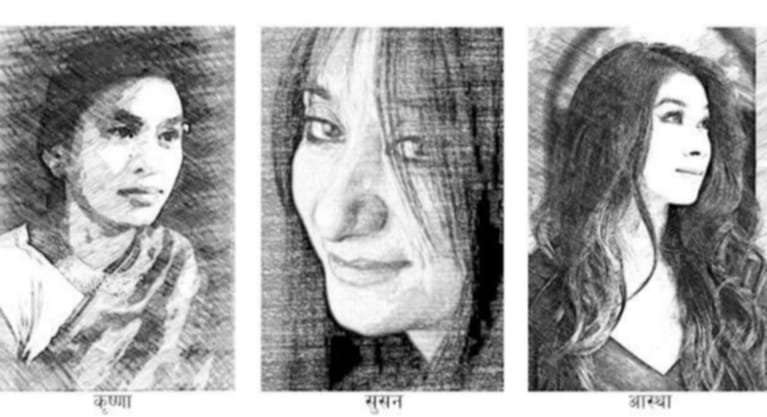
Through daily worship and rituals, Mother Krishna made her wake up early in the morning and search for flowers for worship (especially the Parijat flower, which was instructed to pick only those that fell on the ground), incense, lamps, flowers, Akshata, and Jamara, etc., had a deep impact on the child's mind.
Also, in terms of the atmosphere and attraction of the temple, the crowd of the Kalithan temple in Biratnagar , the sound of the bells , She has beautifully described the effect.
The difference in the sound of the bell, according to the wishes of each hand and mind, reflects the personal experience of spirituality. "The sound of the bell... falling on the eardrum and becoming softer in the remaining vibrations, is felt directly in the mind. But how strange, from each different hand that plays, the sound of the bell comes out differently." She wrote that this is what we also felt when we were children.
Easy faith and prayer:
When she was young, she saw God as a means of solving problems and fulfilling wishes. Stories like praying for good results in exams, pleading with God to get the dress she wanted, reflect the easy faith of childhood. "I could just fold my hands and place all the heat, sorrow, desires and wishes of my heart before God." She says. The influence of the path of devotion and music:
The atmosphere of kirtan and bhajans in the worldly community further strengthened the feeling of devotion. It is mentioned that the music of the Bhajan singer, especially the harmonium-playing Bhajan singer, connected the devotees with spirituality and made them realize the transience of life. "His music became a ladder that connected the devotees with spirituality. The words and rhythms created by that artist would make the eyes of the devotees water with tears, realizing the transience of life."
Among the various dimensions of her mother's spiritual practice, her mother's religious activities such as lighting lakshmi lamps, reciting the Ramayana, and observing fasts had unknowingly led her towards spirituality. "My mother had sown the seeds of spirituality in my childish mind without me knowing it."
She has written that Deviation in faith in God and atheism:
The writer's mother's illness and death have seriously damaged her childhood faith in God. She has presented it in a more poignant manner, fearlessly giving a glimpse of childish science.
In this context, despite the futility of prayer, Santoshi Mata fasted and prayed for her mother's recovery, after her mother's death, she had a great aversion towards God in her heart. "My childish conscience had seen all the blame on God. He took our mother away from us." The statement is no less poignant and touching .
Perhaps he is a child of Jaljala's Maskey . In that sense, it can be assessed that he must have belonged to a wealthy family. However, her inclination was towards something else.
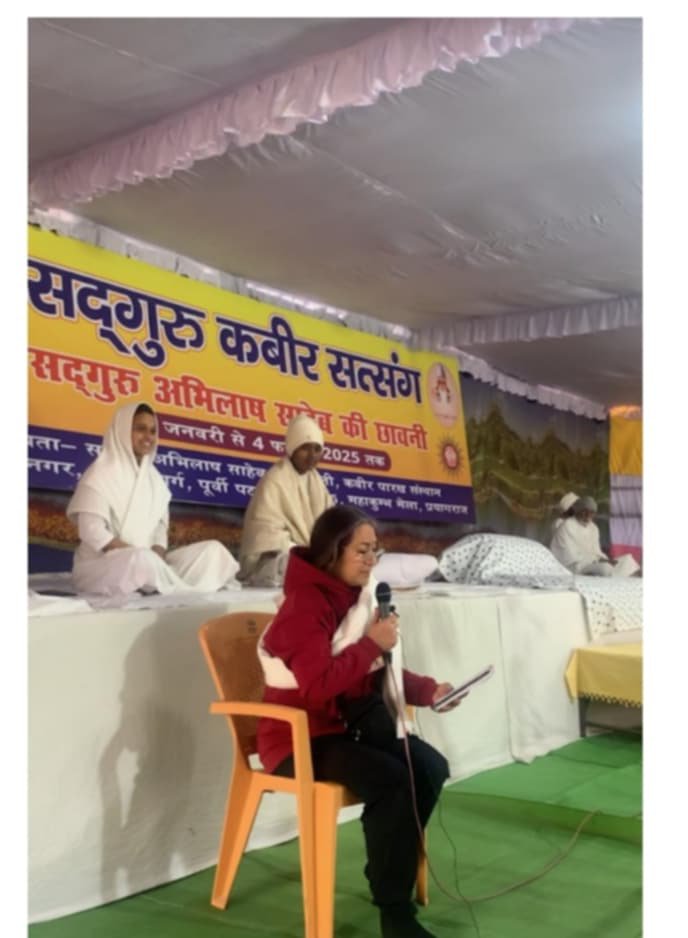
Her view of religion as orthodox and superstitious led her to believe that physics was the answer to everything, but she later realized its limitations. "Religion is the opium of Friedrich Nietzsche." This is also confirmed by the writing.
Motherhood, metaphysical experience and re-belief in God:
The birth of a daughter and a life-and-death incident brought about a 'U-turn' in the author's view of God. The reflection of the mother in the daughter, the daughter's face resembling her mother, made her realize metaphysically that "death is not the end, but rather a continuation, a cycle."
Naming her daughter "Aastha" (faith) also indicates this change. "Having received my third-generation daughter "Aastha", a small sprout of "faith" had sprouted inside my chest, which had been hardened by the cold war for years." The author finds this experience metaphorical because she repeatedly met a woman who looked like her mother during the Chardham Yatra and she addressed the author as "daughter". "Wasn't it metaphorical to keep meeting a woman who looked like a mother on the journey to the four holy places?"
Life-or-death incident and direct experience of God:
When her daughter Astha had a high fever and was in a life-or-death situation, she called out to God again. She stumbled and stumbled, thinking that the stone statue of Lazimpat was probably Ganesh.
At this moment, she experienced God not as an invisible force but in people like the bicycle boy and the taxi driver who helped her. "Didn't God exist in that teenage boy riding a bicycle? Who stopped a taxi for me without me saying anything?"
Reading this reminded me of the fact that even the great poet Lakshmi Prasad Devkota was an atheist and in the latter half of his life, after all, Shri Krishna is one, neither devotion nor knowledge nor intellect..." Ram Hari Joshi has written in his book.
Talking about motherhood and spirituality, in Susan's experience, motherhood does not allow a woman to remain an atheist. "It is unlikely that a woman will remain an atheist after becoming a mother. This is my experience." This shows that the responsibility of a mother inspires a person to believe in an invisible power.
Acceptance of the Unknown God:
She now accepts God not in any specific name or form but as "the unmanifest letter", "the infinite Lord", "the unknown", "being" or "energy light", as can be seen from her writing.
It does not matter to her whether God exists or is imaginary. Her spirituality has become broader and more generous, which she feels is constantly leading her towards the truth. "My God is unknown but is also very visible everywhere and in everything." In the context of the transmission of superstitions and intuition, it covers an interesting topic of how some superstitions have been passed down along with spirituality.
In the Wednesday superstition, Susan's mother believed that new work should not be started on Wednesday, because work started on that day would be spoiled or delayed. This superstition has also been passed down to the writer and her daughter. "This work must have been started on Wednesday." Tuesday's Auspicious Day:
On the contrary, Tuesday was considered an auspicious day and it was believed that work started on this day would be completed easily. Superstition or intuition?:
She questions whether this is not just superstition but whether her mother's "intuition was awakened" or whether she was "psychic." "Isn't intuition?" She presents some of her mother's superstitions (such as sons becoming doctors and engineers, black chickens dying) with examples that have been proven correct.
As evidence of generational transmission, the Wednesday superstition has continued through three generations (mother, writer, and daughter Astha). The fact that there is a custom in Greek culture not to start new work on Wednesday has inspired her to explore its universal nature and the deep meaning it holds. "Such ancestral superstitions sometimes travel from generation to generation, becoming beliefs that are passed down through the experiences of some people. They are repeated." Through her series, Susan Maskey not only tells the story of one person's spiritual journey, but also reflects on and analyzes an in-depth study of how family background, cultural values, and personal experiences shape spirituality and belief systems.
It presents spirituality as a dynamic process that evolves over time, experience, and personal growth. It also presents a new perspective that sees superstitions as intuitive or subconscious knowledge rather than simply logical.
Overall, she has embraced her mother's spirituality as her own path, affirming the power of transmission. The 180-degree change in her thinking that the small stone Ganesh statue in Lazimpat is probably at that intersection is interesting, tragic and logical.
Even though she is a contemporary of ours, during her student days, Susan Maskey sang the backing vocals for the main female character “Simma” in the communist-inspired and progressive lyrical drama "Simma". Her unique performances at University and other cultural programs, including religious ones, are more political than religious, such as songs like "Gau Gau Baata Utha..." composed by Ramesh, who was born in Palpa. She was more influenced by the Ralpha group.
Source: Spirituality and Superstition,
https://bisthapitpatrakar.wordpress.com/2023/12/15/gotha-ko-cha-tinpusta-bhag-13/
- Nepal's Participation In The Landlocked Developing Countries (LLDC) Conference
- Aug 04, 2025
- Former Ambassador To People’s Republic Of China Acharya's 'Diplomatic Diary': A Collection Of "Autobiography " Including Diplomacy
- Jun 17, 2025
- Banker And Businessman Being The Same Person: How Practical, How Impractical
- Jun 01, 2025
- 2082/83 Policy And Program: Presentation New, Short But Not Exciting
- May 07, 2025
- Nepal's Capital Market: Some Analysis
- May 02, 2025

